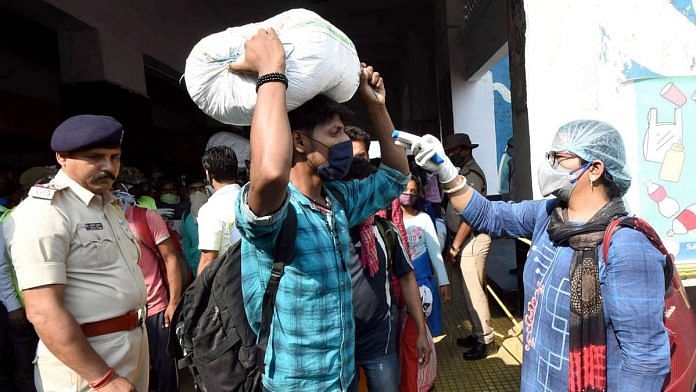Patna: The Bihar government is looking to replicate its successful pulse polio drive of 1998 as it looks to contain the spread of the coronavirus.
Chief Minister Nitish Kumar Wednesday announced that a ‘pulse polio pattern drive’ will be launched from 16 April to contain the Covid-19 pandemic. Bihar had conducted a successful polio eradication campaign in 1998 and had administered polio drops to nearly all of its children.
The coronavirus drive will include door-to-door screening of all those residing within a three-kilometre radius of a positive patient. “A coronavirus positive case will be considered the epicentre,” Bihar Chief Secretary Deepak Kumar told ThePrint. “Two-member teams will be formed, which will go door to door and screen everyone within the three-kilometre radius. The teams will be given personal protective gear. During this screening, anyone found to have symptoms will be quarantined and tested.”
He added that the district administrations will provide security to the teams that will undertake the mission. The chief secretary also claimed that Bihar will be the first state in India to start a pulse polio type containment drive.
Also read: HCQ doesn’t help clear coronavirus, a small study in China finds
State to form 8,000-10,000 teams
Principal Secretary (health department) Sanjay Kumar told The Print that around 8,000 to 10,000 teams will be formed for the Covid-19 drive. “When we did the pulse polio drive, we needed 50,000 teams to cover the entire population of Bihar. In this drive, we expect to cover 16 per cent of the population,” he said. “We are going to begin with the districts of Siwan, Begusrai, Nalanda and Nawada and their adjoining blocks.”
The principal secretary added that the teams will also cover districts that have positive cases.
“The teams will go to all villages that have people who returned from foreign countries between 18 and 23 March,” Sanjay Kumar said. “We will also cover villages that migrant workers returned to.”
He added that the state government expects to complete the exercise within seven to eight days.
Bihar has just 70 positive cases with one death as of Wednesday but the state has faced flak for its low testing numbers. The state has carried out just over 7,500 Covid-19 tests, which is among the least in the country along with West Bengal, Uttar Pradesh and Jharkhand.
Also read: Districts in Delhi, Mumbai, Pune in Red Zone as Modi govt divides country to fight Covid
The polio drive
The current government seeks to learn lessons from the pulse polio drive funded by the Rotary International Club, which began in 1998. “We had to change our strategy three times to ensure 100 per cent of the children were administered the polio drop,” recalled Dr L.B. Singh, the then Rotary Club governor of Bihar and Jharkhand who virtually anchored the anti-Polio drive.
“We started by setting up booths in villages and blocks where people were asked to bring children. But this system led to a large number of children not turning up at the booths,” he added. “Then we started a door-to-door pulse polio drive for which the state government gave us about 1.35 lakh volunteers. In each home when every child had been administered the drop, we left a cross mark at the door.”
“But Bihar had a large number of migrant labourers whose homes were locked. For tackling this problem, we increased the days for administering the dose to almost once a month,” he added.
Experts, however, warned that the two diseases are very different, especially in the mode of transmission. More importantly, they add that the coronavirus has no vaccine. ‘
“The polio virus was acquired due to consumption of contaminated water and food. Therefore the population affected were the downtrodden and poor. The coronavirus can be acquired through just a sneeze,” pointed out Dr. Prabhat Kumar former director of the Rajendra Memorial Research Institute of Medical Sciences in Patna.
He, however, lauded the government for its decision to conduct door-to-door screening. “So far the screening did not ensure that an entire area is safe,” he said.
Also read: With 3% growth this year, India’s agriculture output will be a lone bright spot for economy



